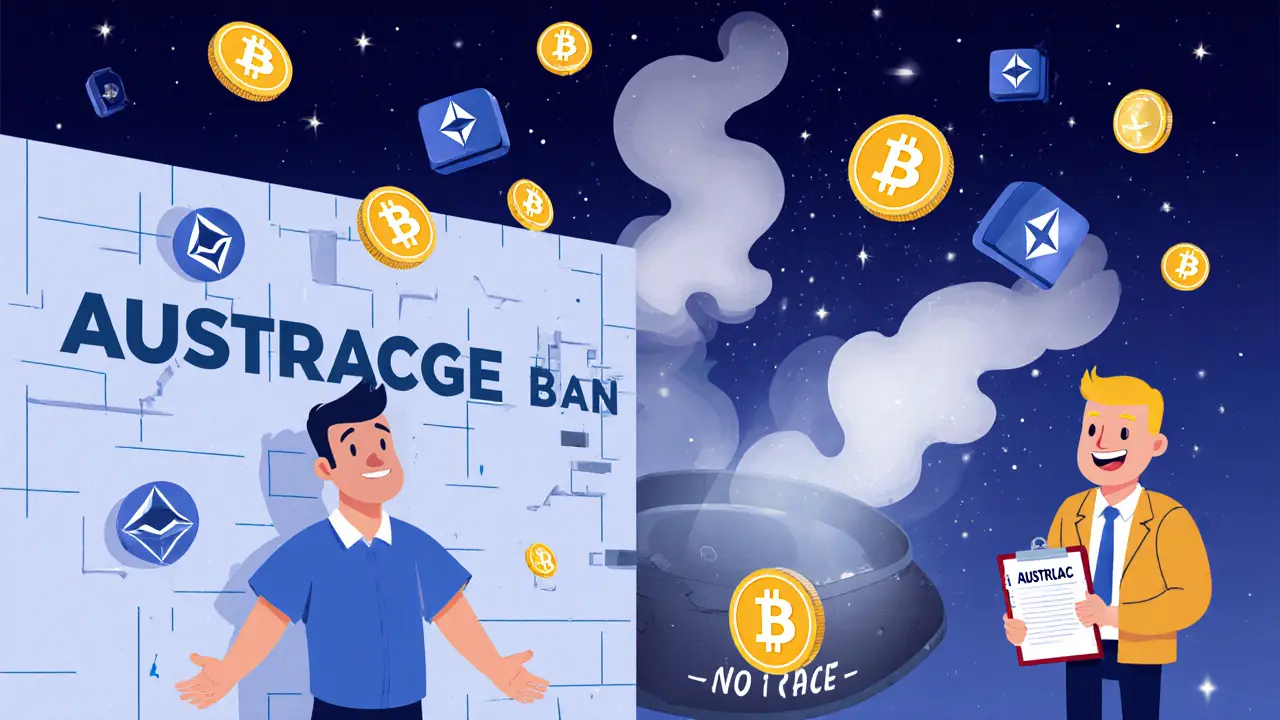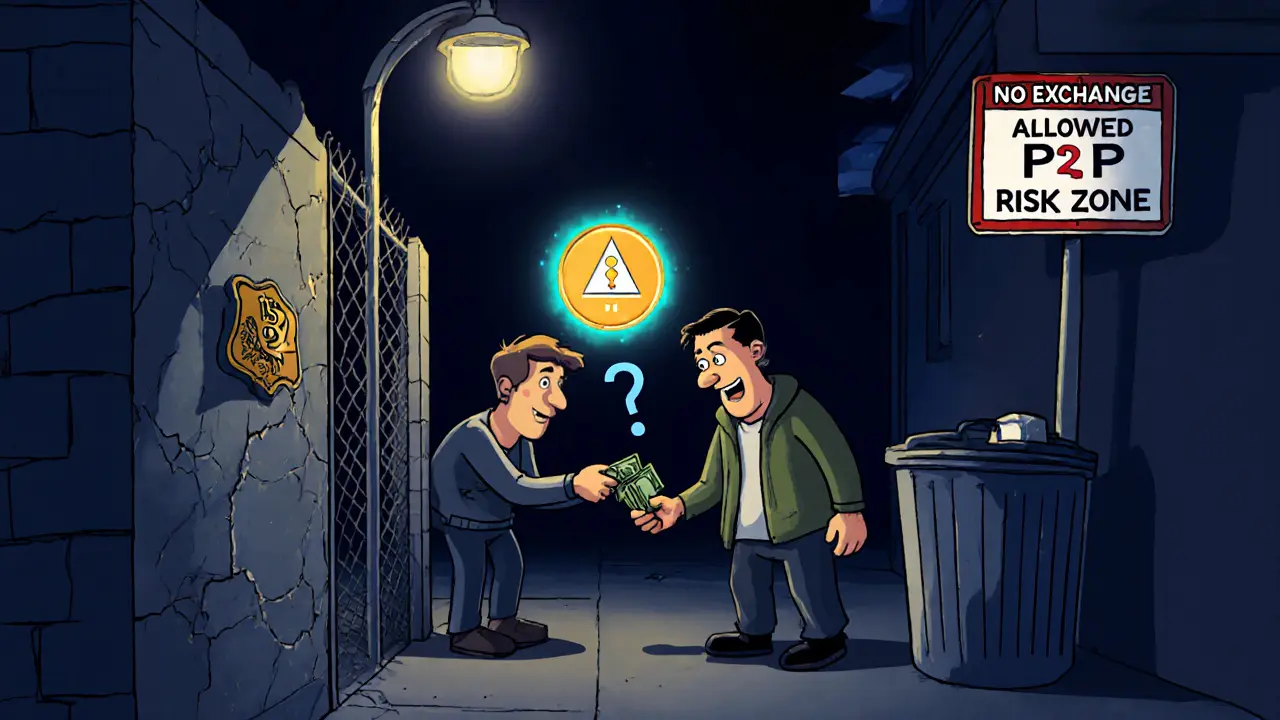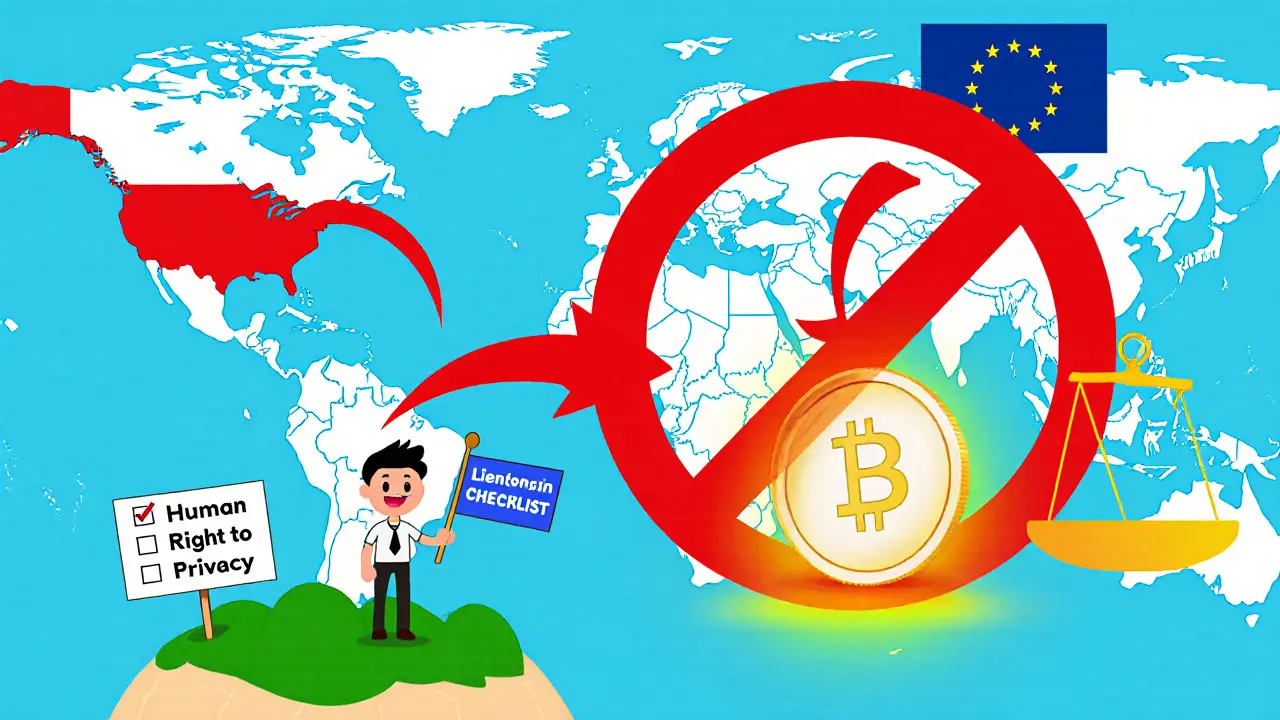
- 17 Sep 2025
- Elara Crowthorne
- 17
Privacy Coin Compliance Checker
Check Your Transaction Compliance
Determine if your privacy coin transaction would comply with Australian regulations based on transaction details.
Compliance Results
Compliance Status:
Compliant
Your transaction would be compliant with Australian regulations.
If you own Monero, Zcash, or Dash in Australia, you can still hold them. But if you try to trade them on any major crypto exchange here, you’ll hit a wall. Since early 2025, every licensed Australian crypto exchange has removed privacy coins from their platforms. It’s not a law that says you can’t own them. It’s a rule that says exchanges can’t list them - and if they do, they risk losing their license.
Why Australia Banned Privacy Coins on Exchanges
The reason isn’t about banning privacy. It’s about tracing money. Australia’s financial regulators, AUSTRAC and ASIC, don’t want crypto exchanges to become hiding places for illegal cash. Privacy coins use advanced tech like ring signatures and zero-knowledge proofs to hide who sent money, who received it, and how much was sent. That’s great for personal privacy - but terrible for banks and law enforcement trying to stop money laundering or terrorist funding. In 2025, 73 global exchanges removed privacy coins. Australia didn’t lead the charge, but it followed quickly. Why? Because exchanges here are legally required to know their customers and track every transaction. With Bitcoin or Ethereum, you can see the flow of funds on the blockchain. With Monero? You can’t. Not even with specialized tools. That’s why AUSTRAC told exchanges: either stop listing privacy coins, or lose your registration. The pressure wasn’t just from regulators. Institutional investors - hedge funds, family offices, even pension funds - pushed for the change. IDAX, one of Australia’s largest crypto platforms, said 78% of its institutional clients supported the removal. They didn’t want the risk of being flagged by global banks or fined by international regulators.What Privacy Coins Are and Why They’re Different
Not all crypto is the same. Bitcoin is public. Anyone can look up a wallet address and see every transaction ever made. Privacy coins change that. Monero uses ring signatures to mix your transaction with others, making it impossible to tell which one is yours. Zcash lets users choose between public and shielded transactions - but exchanges can’t verify shielded ones. Dash uses PrivateSend to mix coins through multiple nodes. These features make privacy coins ideal for people who want financial confidentiality - journalists, activists, or just people who don’t want their spending habits tracked. But they also make them attractive to criminals. The U.S. Treasury Department offered $625,000 to anyone who could break Monero’s privacy. No one has cracked it yet. For exchanges, that’s a problem. If a user deposits Monero and then withdraws it to an unknown wallet, the exchange can’t prove it wasn’t used for crime. And under Australia’s Anti-Money Laundering and Counter-Terrorism Financing Act, that’s a violation. So exchanges removed them - not because they hate privacy, but because they can’t legally offer them.Can You Still Buy Privacy Coins in Australia?
Yes - but not easily. You can’t buy Monero on CoinSpot, Swyftx, or Independent Reserve anymore. But you can still get them through peer-to-peer (P2P) platforms like LocalMonero or Paxful. These sites connect buyers and sellers directly. No exchange holds your money. You pay via bank transfer, PayPal, or even cash. But P2P trading comes with big risks. You could get scammed. You could be dealing with someone using stolen funds. There’s no buyer protection. And if you’re caught using a P2P platform to move large amounts of privacy coins, AUSTRAC might come knocking - even if you did nothing illegal. Since the delistings, P2P activity in Australia has risen 19%. But most users aren’t crypto experts. They’re regular people trying to access assets they believe are legal to own. Now they’re navigating a gray zone with no safety net.
How Australia Compares to the Rest of the World
Australia isn’t alone. Japan banned privacy coins outright in 2018. South Korea’s top five exchanges removed them in early 2025. The EU will ban them completely by July 2027. Binance, Kraken, and Poloniex pulled privacy coins from their U.S. and European platforms in early 2025. But Australia’s approach is different. It didn’t pass a law banning privacy coins. It used existing financial laws to pressure exchanges into removing them. That’s a quieter, more indirect method. It lets the market decide - while keeping regulators in control. Compare that to Switzerland or Liechtenstein, where exchanges still list privacy coins - but only if they do strict KYC and monitor transactions. Those countries are trying to balance privacy with compliance. Australia chose compliance over flexibility.What Happens After March 31, 2026
Right now, the ban on privacy coins is enforced through AUSTRAC’s interpretation of existing rules. But starting March 31, 2026, that changes. AUSTRAC will expand its oversight to cover all digital asset service providers - including wallet providers, DeFi platforms, and even crypto ATMs. That means even if someone tries to build a new platform that lets Australians trade Monero, they’ll be breaking the law. The loophole is closing. What’s now a de facto ban will become a formal one. Industry experts say this move is inevitable. Global banks are refusing to process crypto-related transactions for exchanges that offer privacy coins. Payment processors like Stripe and PayPal won’t touch them. Even crypto-friendly banks in Singapore and the UAE are cutting ties with exchanges that list privacy assets.
Who Supports the Ban - and Who Doesn’t
Institutional investors, banks, and compliance officers support the ban. They see it as a necessary step to bring crypto into the mainstream. Without it, traditional finance won’t touch crypto. And without that, crypto can’t grow. But privacy advocates are angry. On Reddit and Telegram, users argue that financial privacy is a human right. They point out that banks already let people use cash anonymously - why not crypto? They say the ban doesn’t stop criminals - it just pushes them to unregulated platforms. There’s also a generational divide. Younger users, who grew up with digital privacy tools like Signal and ProtonMail, see privacy coins as natural extensions of their values. Older investors, used to traditional banking, see them as risky outliers.What This Means for Your Crypto Strategy
If you’re an Australian investor:- You can still hold privacy coins - but you can’t trade them on local exchanges.
- Don’t assume P2P trading is safe. There’s no protection if things go wrong.
- Keep records of how you acquired privacy coins. If questioned, you’ll need to prove they’re yours.
- Don’t try to use VPNs or overseas exchanges to bypass the ban. That could trigger AUSTRAC reporting.
- If you’re using privacy coins for legitimate reasons (e.g., protecting your business finances), consider talking to a crypto-savvy lawyer before doing anything.
The Bigger Picture: Privacy vs. Regulation
This isn’t just about Monero or Zcash. It’s about whether digital money should be transparent by default. The world is moving toward full traceability. The EU, U.S., and Australia are building systems where every transaction can be tracked. That’s good for stopping crime - but bad for personal freedom. Privacy coins were meant to be the answer to that. Now, they’re being pushed out of the mainstream. Whether they survive depends on whether new tech can satisfy both sides: keeping transactions private while still meeting compliance checks. For now, in Australia, the choice is clear: you can own privacy coins. But you can’t trade them where most people go to buy crypto. The system is designed to make it hard - not impossible - to use them. And that’s exactly what regulators wanted.Can I still own Monero or Zcash in Australia?
Yes. It’s completely legal to own Monero, Zcash, Dash, or any other privacy coin in Australia. The ban only applies to exchanges - not individual holders. You can buy them on overseas platforms or peer-to-peer markets and store them in your own wallet.
Why did Australian exchanges remove privacy coins?
Because they can’t meet Australia’s anti-money laundering rules. Privacy coins hide transaction details, making it impossible for exchanges to verify who sent or received funds. Under AUSTRAC regulations, that’s a compliance failure. Exchanges chose to delist them to avoid fines or losing their licenses.
Can I trade privacy coins on Binance or Kraken from Australia?
No. Binance, Kraken, and other major exchanges removed privacy coins from all their platforms in early 2025, including for Australian users. Even if you use a VPN, these platforms now block access from Australian IP addresses for privacy coin trading.
Is peer-to-peer trading safe for privacy coins in Australia?
It’s risky. P2P platforms like LocalMonero let you trade directly with others, but there’s no buyer protection. You could be scammed, or receive coins tied to criminal activity. If AUSTRAC investigates, you’ll need to prove the coins were acquired legally - and that’s harder without exchange records.
Will Australia ban privacy coins entirely in the future?
Not yet. There’s no law banning ownership. But starting March 31, 2026, AUSTRAC will regulate all digital asset service providers - meaning even decentralized platforms may be forced to block Australian users from trading privacy coins. The ban is becoming more comprehensive, but not absolute.
Do other countries have the same rules?
Yes. Japan banned privacy coins in 2018. South Korea removed them in early 2025. The EU will ban them in 2027. Major exchanges like Binance and Kraken delisted them globally. Australia’s approach is similar to the U.S. and UK - using existing financial laws to pressure exchanges, rather than passing new laws.
Can I use a VPN to access privacy coins on overseas exchanges?
Technically yes - but it’s not recommended. Many exchanges now detect Australian IP addresses even with a VPN. If caught, you could trigger compliance alerts. More importantly, you lose legal protections. If something goes wrong, you have no recourse under Australian consumer law.
What happens if I’m caught trading privacy coins illegally?
You won’t go to jail for owning or trading privacy coins. But if you use an unlicensed platform and AUSTRAC finds you’re moving large amounts, you could face scrutiny. You might be asked to prove the source of funds. If you can’t, your bank could freeze your account or report you for suspicious activity.

17 Comments
This is just the government playing god with your money again. Like, seriously? You can’t even buy Monero without them side-eyeing you like you’re laundering drug cash? Next they’ll ban cash too.
While I understand the regulatory rationale, the erosion of financial privacy in digital systems represents a dangerous precedent. The normalization of surveillance capitalism under the guise of compliance undermines the foundational principles of economic autonomy. One must question whether the convenience of traceability outweighs the existential risk of state-enforced financial transparency.
Let’s be real - if you’re using privacy coins, you’re probably trying to hide something. Australia’s just being smart. We don’t need our banks getting flagged by the FATF because some guy in Melbourne bought Monero to buy weed. Stay legal, folks.
I get why exchanges pulled them. But I still hold Zcash because I believe privacy isn’t a crime. I’m not laundering anything - I just don’t want my grocery spending tracked by some algorithm. That’s not shady, that’s human.
It’s frustrating to see good tech get banned because of bad actors. But I also get that exchanges have to play it safe. Maybe the real solution is better tools for regulators - not blanket bans.
The regulatory arbitrage here is fascinating. AUSTRAC didn’t legislate - they weaponized existing AML/KYC frameworks to force market compliance. This is soft power enforcement at its finest. The blockchain community is now facing a structural inflection point: privacy or liquidity?
People keep saying ‘privacy is a human right,’ but let’s not ignore that criminals use these coins too. I’m not saying ban them outright - but if you can’t verify the source, why should an exchange take the risk? It’s not about trust, it’s about liability.
This isn’t just about crypto - it’s about the cultural shift toward transparency as a virtue. In many Western societies, we’ve normalized the idea that if you have nothing to hide, you have nothing to fear. But privacy isn’t about guilt - it’s about dignity. The fact that we’re even debating this says more about our society than about Monero.
So now you can’t even trade your coins without the government breathing down your neck? What’s next? Mandatory wallet audits? Mandatory transaction explanations? I’m starting to think this isn’t about crime - it’s about control. And control is the real threat here.
If you’re an Aussie holding privacy coins, don’t panic. You’re not breaking the law. You’re just navigating a system that’s still figuring out how to handle digital money. Keep your records. Use P2P wisely. And remember - the future of finance isn’t just about what’s legal, it’s about what’s possible.
I’m glad I held onto my Monero before the delistings. It’s not about hiding from the system - it’s about protecting my right to financial silence. I’m not doing anything illegal, but I don’t owe anyone a breakdown of my spending habits.
Oh please. You people think you’re some kind of digital revolutionaries? You’re just paranoid millennials who don’t understand that banks and governments need to track money. If you want privacy, go live in a cave. Or better yet - use cash. At least then you’re not dragging everyone else into your fantasy world.
Privacy coins are just a fancy way to launder money. If you’re not doing anything wrong, why hide it? This isn’t about freedom - it’s about selfishness. And if you think the government is out to get you, you’re probably the one who needs to be watched.
So… you can still own them, just not trade them? That’s like saying you can own a car, but you can’t drive it on any roads. The whole thing’s a joke. But hey, at least we’re not jailing people for it. I’ll take small wins.
As a compliance officer in fintech, I can confirm: the cost of onboarding privacy coin users exceeds the revenue potential. The risk of regulatory penalties, bank de-risking, and reputational damage is simply too high. This isn’t ideological - it’s actuarial.
Thanks for saying that. I’ve been holding Monero since 2020. I bought it because I was tired of banks tracking my donations to human rights groups. If I had to explain every transaction to some algorithm, I’d stop giving altogether. That’s not freedom - that’s fear.